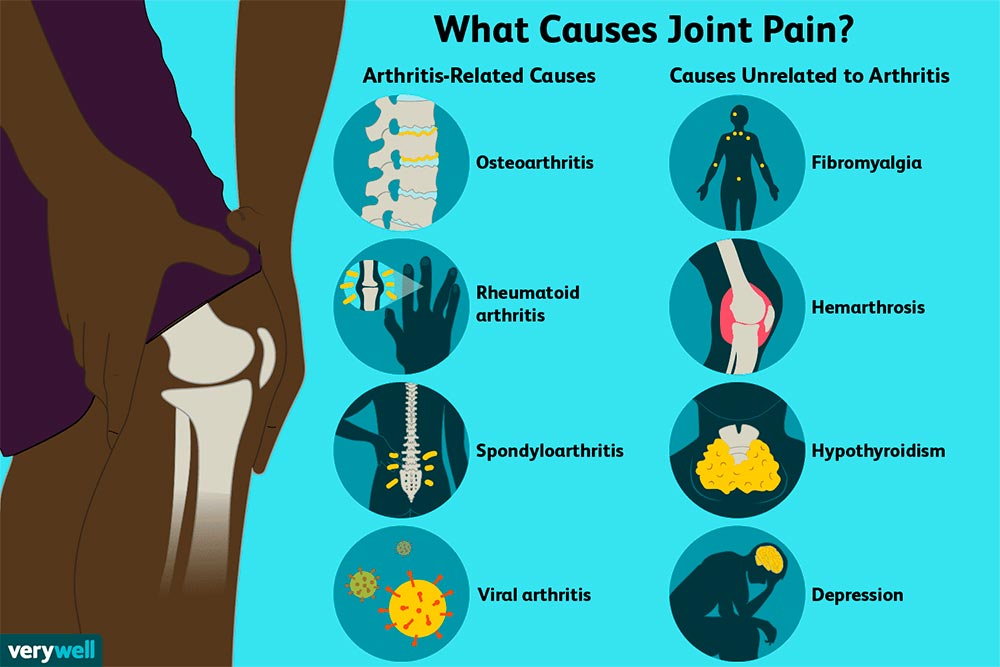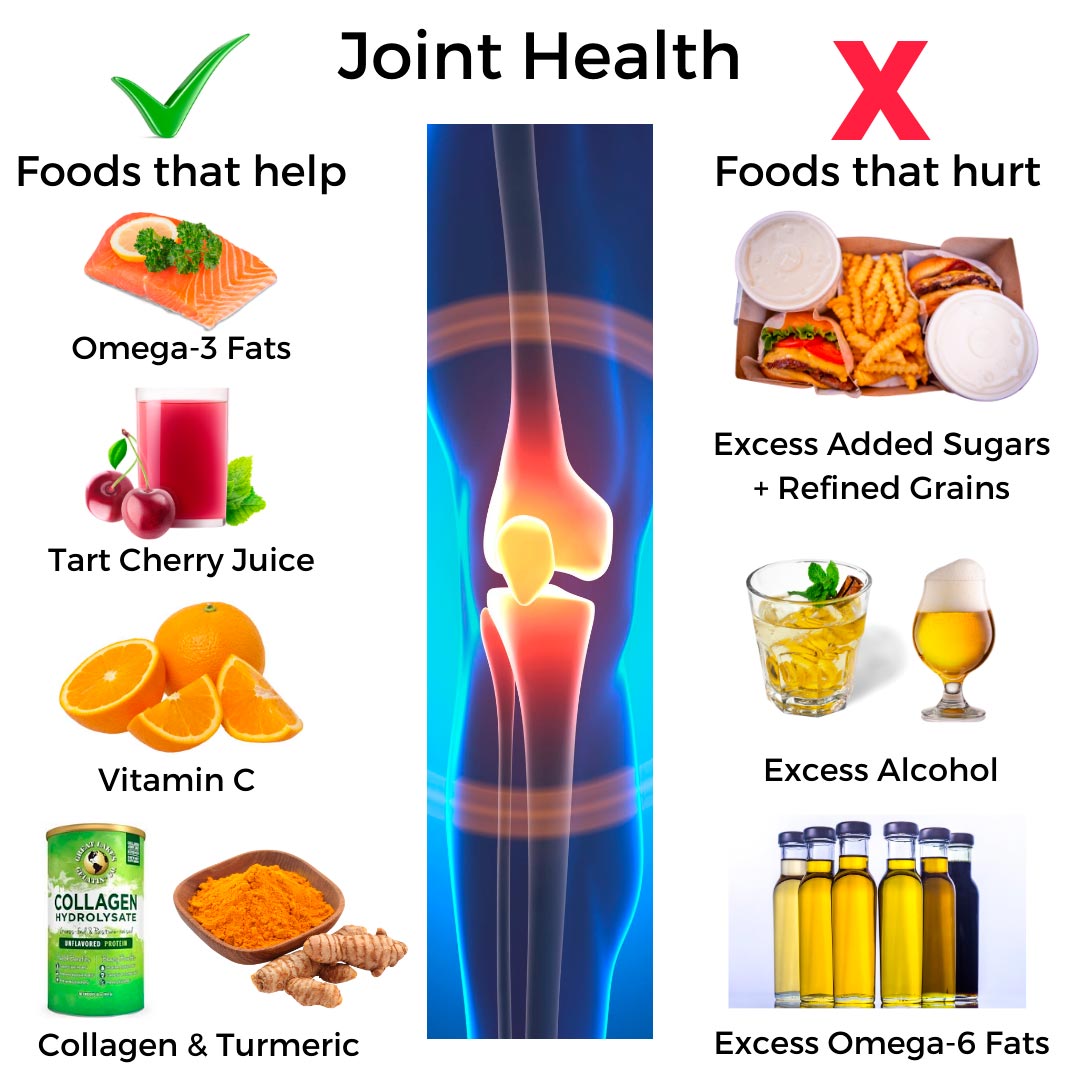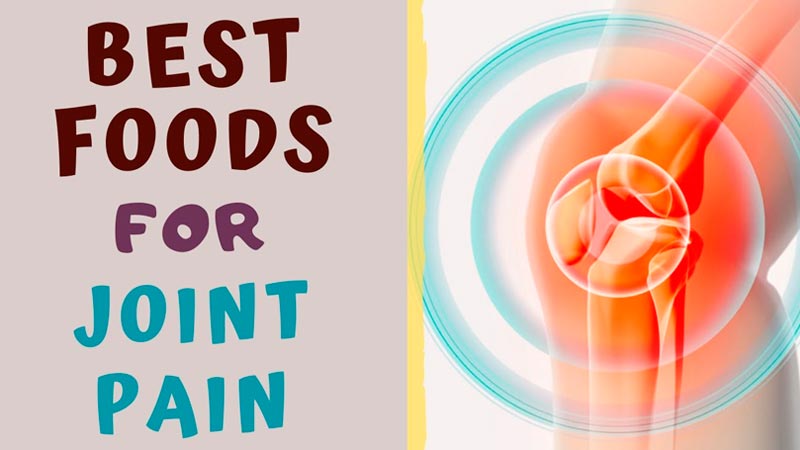Joint pain is a common problem, especially as people age. While there are many factors that can contribute to joint pain, one important aspect to consider is diet.
Table of Contents
Joints are crucial components of our musculoskeletal system, allowing us to move efficiently and without pain. Maintaining the health of these structures is essential for an active and fulfilling life.
Certain foods have been shown to have anti-inflammatory properties that can help reduce joint pain and inflammation. In this article, we will explore some of the best foods for healthy joints.
One of the most important nutrients for joint health is omega-3 fatty acids. Omega-3s are known for their anti-inflammatory properties, which can help reduce joint pain and stiffness. Foods that are high in omega-3s include fatty fish, such as salmon and tuna, as well as flaxseed, chia seeds, and walnuts. In addition to omega-3s, these foods are also rich in other nutrients that are important for joint health, such as vitamin D and calcium.
Understanding Joint Health

Joint health is essential for the body's overall well-being. Joints are the connection points between bones that allow movement. They are lined with cartilage, a rubbery tissue that cushions the bones and helps them glide smoothly. The synovial fluid in the joint also helps to lubricate and nourish the joint.
However, as people age, joint health can deteriorate, leading to conditions such as osteoarthritis, rheumatoid arthritis, and gout. These conditions can cause joint pain, stiffness, and inflammation, making it difficult to perform daily activities.
Several factors can contribute to joint health, including genetics, age, weight, and lifestyle. Taking care of joints through diet and exercise can help prevent joint problems and maintain joint health.
A diet rich in nutrients such as omega-3 fatty acids, vitamin D, and antioxidants can help reduce inflammation, promote bone health, and protect cartilage. Regular exercise, including low-impact activities such as walking, swimming, and yoga, can also improve joint health by strengthening the muscles around the joints and reducing stress on them.
In addition to diet and exercise, other lifestyle changes such as maintaining a healthy weight, avoiding smoking, and reducing stress can also help improve joint health. By taking care of their joints, individuals can improve their overall quality of life and reduce the risk of joint-related conditions.
Importance of Diet in Joint Health
Maintaining healthy joints is crucial for an active and pain-free lifestyle. While exercise and physical therapy are essential for joint health, diet also plays a significant role. A well-balanced diet can help reduce inflammation, improve joint mobility, and prevent joint damage.
Inflammation is one of the primary causes of joint pain and stiffness. Certain foods can trigger inflammation in the body, while others can help reduce it. Foods high in omega-3 fatty acids, such as fatty fish, nuts, and seeds, have anti-inflammatory properties and can help reduce joint pain.
Another essential nutrient for joint health is vitamin C. This vitamin is necessary for the production of collagen, a protein that helps maintain healthy cartilage and joints. Foods rich in vitamin C include citrus fruits, berries, peppers, and leafy greens.
Vitamin D is also crucial for joint health. It helps the body absorb calcium, which is necessary for strong bones and joints. Vitamin D can be found in fatty fish, egg yolks, and fortified foods such as milk and cereals.
In addition to these nutrients, a diet rich in fruits, vegetables, and whole grains can also help improve joint health. These foods are high in antioxidants, which can help reduce inflammation and prevent joint damage.
On the other hand, processed foods, sugary drinks, and foods high in saturated and trans fats can contribute to inflammation and joint damage. It's essential to limit these foods in the diet and focus on whole, nutrient-dense foods instead.
Overall, a well-balanced diet is essential for maintaining healthy joints. By incorporating foods rich in anti-inflammatory nutrients and limiting processed and unhealthy foods, individuals can help reduce joint pain and improve joint mobility.
Best Foods for Healthy Joints
Maintaining healthy joints is vital for overall mobility and well-being. While there are many factors that contribute to joint health, diet plays a significant role. Incorporating certain foods into your diet can help reduce inflammation, promote bone health, and support joint function.
Fatty Fish
Fatty fish like salmon, tuna, and mackerel are rich in omega-3 fatty acids, which have anti-inflammatory properties. These fatty acids can help reduce joint pain and stiffness, making them an excellent food for joint health. Additionally, they are a good source of vitamin D, which is essential for bone health.
Berries
Berries like strawberries, blueberries, and raspberries are packed with antioxidants that can help reduce inflammation and protect against cellular damage. They also contain vitamin C, which is essential for collagen production, a vital component of healthy joints.
Green Tea
Green tea is loaded with antioxidants called catechins, which have anti-inflammatory effects. Drinking green tea regularly can help reduce joint pain and stiffness, making it a great addition to a joint-healthy diet.
Garlic
Garlic contains compounds that have anti-inflammatory effects, making it an excellent food for joint health. Additionally, it has been shown to have bone-protective effects, making it an essential food for overall bone health.
Nuts
Nuts like almonds, walnuts, and pistachios are rich in healthy fats, protein, and fiber. They also contain vitamin E, which has been shown to have anti-inflammatory effects. Adding nuts to your diet can help reduce inflammation and support joint health.
Incorporating these foods into your diet can help support joint health and reduce the risk of joint-related conditions. However, it's essential to remember that a healthy diet is just one part of maintaining healthy joints. Regular exercise, maintaining a healthy weight, and avoiding smoking are also essential for joint health.
Water
While not a food, the importance of water for joint health cannot be underestimated. Water helps keep cartilage hydrated and in good condition, allowing for better absorption of essential nutrients.

Foods to Avoid for Joint Health
Processed Foods
Processed foods are a major contributor to inflammation in the body, which can worsen joint pain. These foods are often high in refined carbohydrates, unhealthy fats, and added sugars. Examples of processed foods to avoid include:
- Fast food meals
- Frozen dinners
- Packaged snacks like chips and crackers
- Canned soups and vegetables
- Sweetened breakfast cereals
Sugary Drinks
Sugary drinks like soda, sports drinks, and fruit juices are high in added sugars, which can increase inflammation and contribute to weight gain. Excess weight puts extra pressure on the joints, leading to more pain and discomfort. It's best to limit or avoid these types of drinks altogether.
Red Meat
While red meat can be a good source of protein, it's also high in saturated fats, which can increase inflammation in the body. Eating too much red meat may also contribute to weight gain, putting additional stress on the joints. It's best to limit consumption of red meat and opt for leaner protein sources like chicken, fish, and beans instead.
By avoiding processed foods, sugary drinks, and excessive amounts of red meat, individuals can help reduce inflammation in their bodies and improve joint health.
Incorporating Joint-Healthy Foods into Your Diet
Meal Planning
Incorporating joint-healthy foods into your diet can be as simple as planning meals ahead of time. By preparing meals in advance, you can ensure that you have the necessary ingredients on hand to make healthy, joint-friendly meals. Here are some tips for meal planning:
-
Make a list of joint-healthy foods: Some foods that are beneficial for joint health include fatty fish, nuts, leafy greens, and berries. Make a list of these foods and incorporate them into your meals throughout the week.
-
Plan for leftovers: Cooking in bulk and saving leftovers can save time and ensure that you always have a healthy meal option available. Leftovers can also be used for meal prepping lunches for the week.
-
Mix up your protein sources: Incorporating a variety of protein sources can help ensure that you are getting all the necessary nutrients for joint health. Some good protein sources include lean meats, poultry, fish, beans, and lentils.
Healthy Recipes
Here are some healthy recipes that incorporate joint-healthy foods:
-
Grilled Salmon with Avocado Salsa: This recipe is packed with omega-3 fatty acids, which are beneficial for joint health. The avocado salsa adds healthy fats and antioxidants.
-
Quinoa Salad with Roasted Vegetables: This recipe is packed with nutrient-dense vegetables, including leafy greens, which are beneficial for joint health. Quinoa is also a good source of protein and fiber.
-
Lentil Soup: Lentils are a good source of protein and fiber, both of which are important for joint health. This recipe also incorporates nutrient-dense vegetables and herbs, which add flavor and antioxidants.
Incorporating joint-healthy foods into your diet doesn't have to be difficult. With a little bit of planning and some healthy recipes, you can improve your joint health and overall well-being.
Conclusion
In conclusion, maintaining healthy joints is crucial for overall well-being and quality of life. A balanced diet that includes foods rich in vitamins, minerals, and antioxidants can help prevent joint damage and reduce inflammation.
Incorporating joint-friendly foods such as fatty fish, nuts, and leafy greens into one's diet can provide the necessary nutrients for healthy joints. Additionally, reducing the intake of processed and sugary foods can help prevent joint inflammation and pain.
It's important to note that while diet can play a significant role in joint health, it is not a cure-all. Regular exercise, maintaining a healthy weight, and proper posture are also essential for joint health.
By making small changes to one's diet and lifestyle, individuals can improve their joint health and reduce the risk of joint-related diseases such as osteoarthritis.
Eat well, live better!




